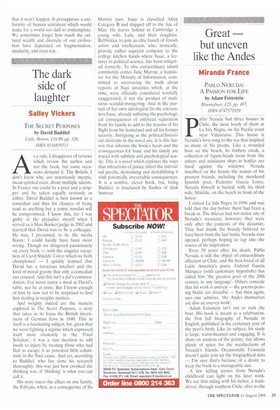The dark side of laughter
Salley Vickers
THE SECRET PURPOSES
by David Baddiel Little, Brown. £16.99. pp. 320, ISBN 0316859311 As a rule, [disapprove of reviews which review the author and not the book, but some occasions demand it. The British, I don't know why, are notoriously myopic, mean-spirited even, about multiple talents. In France one could be a poet and a stripper and be taken equally seriously as either. David Baddiel is best known as a comedian and thus his chances of being read as anything but a comic novelist will be compromised. I know this, for I was guilty of the prejudice myself when I served as a Man Booker judge in 2002 and learned that David was to be a colleague. He was, I presumed, to be the media floozy; I could hardly have been more wrong. Though we disagreed passionately on every book — with the singular exception of Carol Shields' Unless which we both championed — I quickly learned that David has a ferocious intellect and the kind of moral gravity that only a comedian can conceal. And this isn't a pal's commendation. I've never eaten a meal at David's table, nor he at mine. But I know enough of him by now not to be surprised to find him dealing in weighty matters. And weighty indeed are the matters explored in The Secret Purposes, a story that takes as its focus the British internment of German Jews in 1940. This in itself is a fascinating subject, for, given that we were fighting a regime which expressed itself most virulently in the 'Final Solution', it was a rum decision to add insult to injury by treating those who had fled to escape it as potential fifth columnists in the Nazi cause. And yet, according to Baddiel, who has done his research thoroughly, this was just how crooked the thinking was, if 'thinking' is what you can call it.
His story traces the effect on one family, the Fabians, when, as a consequence of his Marxist past, Isaac is classified Alien Category B and shipped off to the Isle of Man. He leaves behind in Cambridge a young wife, Lulu, and their daughter, Rebbekka, to join an elite bunch of Jewish artists and intellectuals, who, ironically, provide rather superior company to the college kitchen hands where Isaac, a lecturer in political science, has been relegated formerly. To this extraordinary island community comes June Murray, a translator for the Ministry of Information, committed to uncovering the truth about reports of Nazi atrocities which, at the time, were officially considered woefully exaggerated, if not the product of malicious scandal-mongering. And in the pursuit of her own ideological fix she encounters Isaac, already suffering the psychological consequences of enforced separation from his family to add to the trauma of his flight from his homeland and all his former security. Intriguing as the political/historical elements in the novel are, it is this liaison that informs the book's heart and the consequences for Isaac and his family are traced with subtlety and psychological acuity. This is a novel which explores the ways that infractions of justice infect the individual psyche, destraining and destabilising it with potentially irreversible consequences. It is a sombre, clever book, but, being Baddiel, is irradiated by flashes of dark humour.


























































 Previous page
Previous page